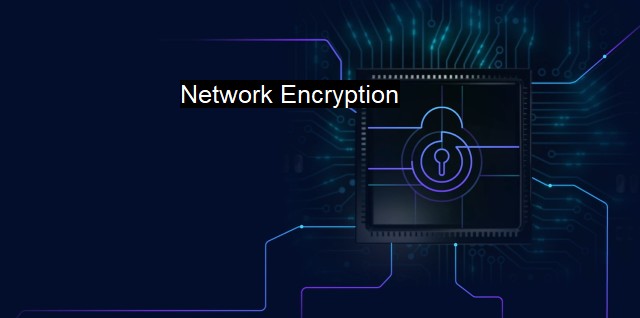What is Network Encryption?
Safeguarding Data: The Power and Importance of Network Encryption for Cybersecurity and Antivirus Protection
Network encryption is a highly crucial process implemented in the realm of cybersecurity to ensure the safe and efficient transmission of data across the globe. It refers to the method of encoding or disguising data sent over a network such that unauthorized users and malicious hackers are unable to interpret it. To fulfill the immense need for privacy in the modern communication era, network encryption is an important tool, making the route travelled by data invisible to outsiders. As widespread data breaches, cyber-attacks, and transnational cyber-crime plague our world, the indispensability of network encryption cannot be overstated.Encryption is rooted in cryptography, the science of secure communications and codes. Advanced algorithms are utilized to convert plaintext data into an unintelligible form known as ciphertext, which can be subsequently decrypted upon reaching its destination. During transmission, this ciphertext is impervious to external infiltration, ensuring that the data will stay secure even if intercepted during transit.
Network encryption protocols act as the rules followed during encryption and decryption. They exist to maintain a standard level of security and sanctity across communications channels and networks, preserving confidentiality, integrity, and authenticity. Several such protocols include Secure Sockets Layer (SSL), Transport Layer Security (TLS), and Internet Protocol Security (IPSec).
SSL and TLS protocols are implemented to secure communications over a network, primarily seen in web traffic to and from secure pages, such as online banking or shopping websites. The information exchanged is only accessible to the website and the user, forming a secure tunnel of communication resistant to outside prying.
Conversely, IPSec is a collection of protocols deployed by network devices like routers and firewalls to secure IP communications. This set of protocols is typically used by Virtual Private Networks (VPN), creating secure links over less secure public networks such as the internet.
In short, network encryption promotes data safety in a world young with interconnected commerce and communications. It ensures that sensitive and significant data transmitted is accessible only to authenticated users, protecting data from the countless, often invisible cybersecurity pitfalls on the internet. A rise in data breaches and cyber threats has led to an all-time high demand for quality network encryption services.
One such emerging threat are advanced persistent threats (APTs) - long-term, targeted cyber-attacks designed to perennially extract data, causing immense harm to network security. By applying intricate network encryption, possible data exposure is minimized, keeping sensitive data under wraps from stealthy APTs.
Ransomware, another prevalent cyber threat, has evolved drastically. Cybercriminals employ this type of malware to encrypt organizational data for ransom. institutions that use encryption can counteract these breaches since the stored data is already encrypted, rendering ransomware's encryption inert.
Advancements in network encryption also play a crucial role in fostering user trust and promoting growth in areas like e-commerce, which rely heavily on the user’s faith in networked business transactions. When users feel safe to provide sensitive data like credit card numbers, the overall customer experience improves, driving additional transactions and fostering revenue growth for online businesses.
Modern antivirus software often includes features for network encryption. Antivirus software safeguards computer systems from various threats by detecting, preventing, and resolving them. By including network encryption in their services, antivirus companies take preventative measures against potential network security breaches and ensure a more secure digital working space.
Without a doubt, network encryption has a pivotal role in cybersecurity. Through complex algorithms and advanced encryption protocols, information undergoing transit is kept secure from malicious threats. Coupled with protective tools such as antivirus software, network encryption remains a fundamental strategy in creating a safer and more secure internet for the digital age. Increases in cyber-attacks worldwide have underlined the importance of such implementing this technology, as it serves as a formidable first line of defense against data theft, loss, and exposure, promoting overall cybersecurity.

Network Encryption FAQs
What is network encryption?
Network encryption is the process of securing data that is transmitted over a network by converting it into a code to prevent unauthorized access to sensitive information.Why is network encryption important for cybersecurity?
Network encryption is important for cybersecurity because without it, sensitive information can be intercepted and stolen by cybercriminals, leading to data breaches and other security incidents. Network encryption helps to keep data confidential and secure.What are the different types of network encryption?
The different types of network encryption include symmetric encryption, asymmetric encryption, and hybrid encryption. Symmetric encryption uses the same key for both encryption and decryption, while asymmetric encryption uses a public key for encryption and a private key for decryption. Hybrid encryption combines both symmetric and asymmetric encryption to provide enhanced security.How can antivirus software help with network encryption?
Antivirus software can help with network encryption by detecting and removing malware that may be designed to bypass encryption and steal data. Additionally, some antivirus software may offer encryption features to help users secure their data and protect it from cyber attacks.| | A | | | B | | | C | | | D | | | E | | | F | | | G | | | H | | | I | | | J | | | K | | | L | | | M | |
| | N | | | O | | | P | | | Q | | | R | | | S | | | T | | | U | | | V | | | W | | | X | | | Y | | | Z | |
| | 1 | | | 2 | | | 3 | | | 4 | | | 7 | | | 8 | | |||||||